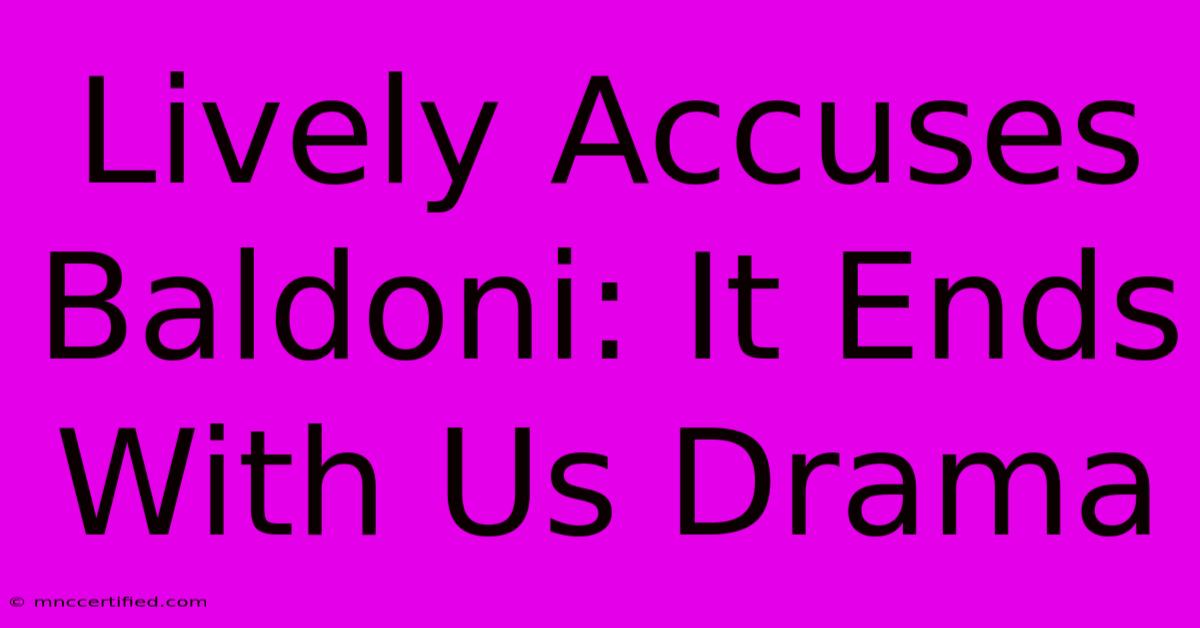Lively Accuses Baldoni: It Ends With Us Drama

Table of Contents
Lively Accuses Baldoni: Unpacking the "It Ends With Us" Drama
The Colleen Hoover novel, "It Ends With Us," already a bestseller, ignited a firestorm of controversy recently when actress Blake Lively seemingly accused author Colleen Hoover and her husband, Tim Baldoni, of plagiarism. While the accusations haven't been explicitly stated as such by Lively, online discussions are rife with speculation and interpretations of her social media activity and subtle hints. This article delves into the "Lively accuses Baldoni" drama, exploring the specifics of the alleged plagiarism and its impact on the literary world.
The Origin of the Controversy: Social Media Speculation
The controversy surrounding Colleen Hoover and Blake Lively largely stems from unsubstantiated online chatter. No direct accusation of plagiarism from Lively herself has been publicly released. Instead, the drama unfolds through a complex web of inferred meanings from social media posts, comments, and the interpretation of subtle hints. Many believe Lively's actions, including seemingly cryptic Instagram posts and interactions with fans, point towards an underlying discontent with "It Ends With Us" and its authors. This has fueled a frenzy of speculation within online communities, particularly on platforms like TikTok and Twitter.
What are the Allegations?
The central claim within the online discourse revolves around the alleged similarity between elements of "It Ends With Us" and an unspecified previous work. While no specific work is consistently named as the source of the alleged plagiarism, the online discussion centers around the plot points, character arcs, and thematic elements supposedly borrowed from another, perhaps lesser-known, source. The lack of concrete evidence makes definitive statements difficult, but the intensity of online discussion cannot be ignored.
Analyzing the "Evidence": A Deep Dive into Online Interpretations
The "evidence" used to support the allegations is largely circumstantial. This includes:
- Vague Social Media Posts: Some interpret Lively's social media activity as veiled criticism of Hoover's work, hinting at plagiarism without explicitly naming it. These posts are often analyzed and reinterpreted by fans and critics alike, further fueling the drama.
- Fan Interpretations: Online communities have played a significant role in amplifying the speculation. Fans analyze the alleged similarities, creating and sharing their own interpretations and "evidence" which further spreads the narrative.
- Absence of Direct Accusation: The lack of a direct statement from Lively makes the situation more ambiguous. This fuels the ongoing debate, as people speculate on her motivations and the true nature of the alleged plagiarism.
The Impact on Colleen Hoover and Tim Baldoni's Reputation
The online drama has undoubtedly had an impact on Hoover and Baldoni's reputation, although the extent is difficult to quantify. The negative publicity could potentially affect future book sales and brand partnerships. The ambiguous nature of the accusations, however, makes it hard to determine the long-term consequences. Their silence on the matter so far only adds to the speculation and controversy.
The Importance of Proper Attribution and Copyright Law
Regardless of the specifics of the "Lively accuses Baldoni" situation, the incident highlights the crucial importance of proper attribution and adherence to copyright law in the literary world. Authors and publishers must take responsibility for ensuring their work is original and properly credits all sources of inspiration. Any perceived plagiarism can have serious consequences, damaging reputations and potentially leading to legal action.
Conclusion: Navigating the Murky Waters of Online Speculation
The "Lively accuses Baldoni" drama illustrates the power of online speculation and the challenges of navigating social media in the age of instant information dissemination. While the lack of direct accusations from Lively makes it impossible to definitively conclude anything, the situation serves as a reminder of the importance of ethical authorship and the potential impact of even unsubstantiated allegations in the digital age. The ongoing discussion continues to highlight the complexities of creativity, inspiration, and the delicate balance between borrowing and plagiarism in the literary world. Only time will tell the true extent of this controversy's impact on both Blake Lively and Colleen Hoover's respective careers.

Thank you for visiting our website wich cover about Lively Accuses Baldoni: It Ends With Us Drama. We hope the information provided has been useful to you. Feel free to contact us if you have any questions or need further assistance. See you next time and dont miss to bookmark.
Featured Posts
-
Clement Names Side Vs Dundee
Dec 22, 2024
-
Confirmed Barca Vs Atletico Starting Xi
Dec 22, 2024
-
Nottingham Forest Win Brentford Report And Analysis
Dec 22, 2024
-
U Conn Women Fall To Usc Watkins
Dec 22, 2024
-
Live Blog Atletico Vs Barcelona La Liga
Dec 22, 2024